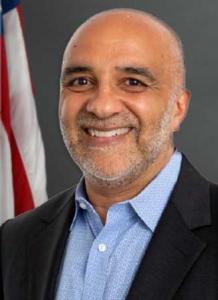Podcast: Play in new window | Download

Our guest this week is Micky Tripathi, the National Coordinator for Health Information Technology at the U.S. Department of Health and Human Services, where he leads the formulation of the federal health IT strategy and coordinates federal health IT policies, standards, programs, and investments. As the Office of the National Coordinator (ONC) chief, Micky Tripathi is advancing healthcare interoperability to support value-based payment and improved health equity. Before taking the helm of the ONC a year ago, Micky served as chief alliance officer for Arcadia, a population health management and healthcare intelligence platform company.
Our conversation with Micky covers the ONCs efforts in COVID-19 response in support of public health, aligning with federal partners, improving health equity through purposeful and intelligent HIT design, improving EHR and interoperability, TEFCA standards adoption, information blocking, FHIR APIs, and the development of a robust apps ecosystem to improve population health.
This episode is sponsored by Arcadia, the only healthcare data and software company dedicated to healthcare organizations achieving financial success in value-based care, and recognized as Best in KLAS in Value-Based Care Managed Services three years in a row.
Episode Bookmarks:
01:50 Introduction to Micky Tripathi – the National Coordinator for health information technology with the ONC
02:20 This week’s sponsor: Arcadia – Recognized as Best in KLAS in Value-Based Care Managed Services 4 years in a row
04:15 Visit arcadia.io/theschema to explore how we can use data to improve the current and future state of healthcare
05:00 There are 40 times more bytes in the digital universe than there are stars in the observable universe!
07:20 Micky provides perspective on how to begin getting more visibility into data and analytics in order to transition from volume to value
08:10 How the data explosion and exponential growth of computing power requires data liquidity and fluidity
09:00 The increasing competition for data science expertise – how does healthcare compete with tech companies and financial industries?
10:20 The self-imposed industry barrier of cleaning and wrangling data and the need for authorized aggregation of health data
11:20 Rethinking what access to data means in light of the information blocking rules within the 21st Century Cures Act
12:15 Micky references his tenure with Arcadia and how the information sharing landscape is changing population health management
12:40 Making both structured and unstructured data available and how/why unstructured data is valuable
14:30 The implications of SDOH on health equity and the concept of “health equity by design” where SDOH can be a core feature of Health IT
16:50 Micky explains how the ONC is influencing “health equity by design” through the trajectory of Health IT
18:00 Accessing data to identify outcomes disparities in communities and the heterogeneity of data collection (e.g. OMB and CDC classifications)
20:00 Deploying data-driven, upstream interventions for social determinants of health (e.g. UT Dell Med Community-Driven Initiatives)
21:40 Streamlining consistency and focus in the collection of race, ethnicity, and language data to lower friction in healthcare
23:00 How lack of “health equity by design” contributed to the development of modern-day EHR systems
25:00 How an event notification algorithm design flaw caused failure in providing appropriate population health interventions
27:20 “Value based care is critically important and it is a key driver of interoperability. We need to move from basic information exchange to apps that will use the whole portfolio of interoperability capabilities.”
28:00 FHIR-based CDS Hooks – an HL7 specification for clinical decision support
29:20 “The business case for Value-based Care is a key driver of interoperability in the marketplace.”
31:45 Information blocking is due to lack of economic incentives (not intentions)
33:00 Micky explains how TEFCA will drive network interoperability and how ONC implementation will support value-based care
36:45 The availability of FHIR APIs by all EHR systems due to technical requirements of the 21st Century Cures Act
37:45 Creating a vibrant app ecosystem through FHIR APIs
38:30 FHIR Bulk Data Access
41:30 How the ONC’s interoperability vision and the 2020-2025 Federal Health IT Strategic Plan will set policy prioritization and government agency alignment
46:45 Micky discusses the ONC’s “Health Interoperability Outcomes 2030” idea crowdsourcing initiative helped prioritize a set of interoperability outcomes
52:00 Micky discusses the importance of having a trusted exchange network and nationwide interoperability governance using the example of cellular network connectivity
54:00 How can TEFCA help open doors of opportunity for the market to further drive interoperability?
55:30 “Payer participation in information exchange with providers should be a two-way street.”
59:00 Micky provides an overview of the 21st Century Cures Act, how it impacts information sharing regulations, and how it compliments HIPAA
63:00 An update on the current status of the 21st Century Cures Act implementation
64:00 How the ONC processes complaints for Information Blocking in conjunction with the OIG
65:00 The fines and penalties for EHR vendors in breach of Information Blocking Rule
70:00 Micky explains how we should get EHR vendors to make open APIs available (“The aggregation of demand gets the supply-side to move.”)
73:00 The role of patients in advocating for more information sharing
75:00 The opportunity for patient engagement in healthcare through apps (comparison to TikTok)
77:00 Closing sponsor message from Arcadia

